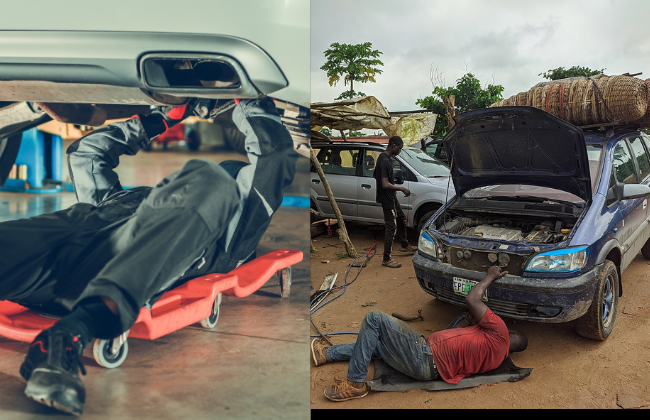A staff member told us a story.
A friend of hers once
bought a brand-new car—a sleek, shiny SUV he had saved up for years. But
within a few months, the car started having issues. The engine made strange
noises, the tires wore out too quickly, and it seemed like every trip to the
mechanic came with a new bill.
When she asked him about
his car habits, it all made sense. He never serviced the car on time, ignored
warning lights, and drove like he was in a Fast & Furious movie.
The truth is, many car
problems come from how you treat your vehicles. In this blog post, you'll learn
five common mistakes that can damage your car and simple tips to avoid them. Ready? Let's go all in:
5 Mistakes That Damage Your Car and How to Avoid Them

1. Skipping Regular
Maintenance
Think of your car like
your health. Skipping regular check-ups is like ignoring annual health
screenings. Small issues can snowball into big problems.
What Happens When You
Skip Maintenance?
- Oil Changes: Old oil thickens
and loses its ability to lubricate your engine. This can cause engine
parts to grind together, leading to costly repairs.
- Brake Checks: Worn-out brake
pads can damage your rotors and make stopping unsafe.
- Fluid Levels: Low coolant or
transmission fluid can cause overheating or transmission failure.
How to Avoid This
Mistake
- Stick to your car’s maintenance
schedule. Check your owner’s manual for guidance.
- Find a trusted “mechanic near
you” for regular checkups.
- Skipping maintenance to save
money might seem smart, but trust us, car repairs for neglected issues
cost way more.
2. Driving on Worn-Out
Tires
Driving on bad tires is
like walking on worn-out shoes—you'll eventually trip. Worn tires can cause
accidents, reduce fuel efficiency, and damage your car’s suspension.
How Do You Know Your
Tires Are Worn Out?
- They’re bald or have very
little tread.
- You feel vibrations when
driving.
- You see cracks or bulges on the
sidewalls.
- How to Avoid This Mistake
- Check your tire pressure
monthly and before long trips.
- Rotate your tires every 5,000
to 7,000 kilometers.
- Replace tires when the tread
depth is below 1.6mm.
- Investing in good tires not
only protects you but also saves your car from unnecessary strain.
3. Ignoring Dashboard
Warning Lights
Have you ever seen the
check engine light come on and thought, “It’s probably nothing serious”? Big
mistake.
What Happens When You
Ignore Warning Lights?
- A simple issue, like a loose
gas cap, can turn into a bigger problem, like reduced fuel efficiency.
- Ignoring the oil pressure light
can lead to engine failure.
- Overlooking the battery light
might leave you stranded with a dead car.
How to Avoid This
Mistake
- Don’t ignore dashboard
warnings. They’re there for a reason.
- If a light stays on, get your
car checked by a mechanic immediately.
- Use a diagnostic tool or visit
a “mechanic near you” to understand the problem.
- Treat warning lights like a
doctor’s prescription—act on them quickly to avoid complications.
4. Overloading Your Car
Your car has limits, and
pushing it beyond those limits can lead to serious damage. Overloading strains
the suspension, tires, and brakes.
Signs Your Car Is
Overloaded
- It feels sluggish or hard to
control.
- You notice unusual wear on your
tires.
- Your suspension sagging or bounces
excessively.
How to Avoid This
Mistake
- Check your car’s weight limits
in the owner’s manual.
- Avoid carrying unnecessary
items in your trunk.
- If you regularly haul heavy
loads, consider upgrading to a vehicle designed for it.
- By respecting your car’s weight
limits, you’ll extend its life and avoid costly car repairs.
5. Driving Aggressively
Speeding, hard braking,
and sharp turns might look cool in movies, but in real life, they’re bad for
your car. Aggressive driving causes excessive wear on your brakes, tires, and
suspension.
What Happens When You
Drive Aggressively?
- Your brakes overheat and wear
out faster.
- Your tires lose tread quickly.
- Your engine works harder,
reducing fuel efficiency and lifespan.
How to Avoid This
Mistake
- Drive at a steady speed and
avoid sudden stops.
- Leave enough space between you
and the car ahead to brake smoothly.
- Follow the speed limit - it’s
there for your safety and your car’s health.
- Driving gently is not only
safer but also saves you money on repairs.
Cars are expensive, and
for most people, they’re a major investment. By avoiding these common mistakes,
you’re not just saving money- you’re also keeping your car reliable for years
to come. Imagine going months or even years without major car repairs or
breakdowns. It’s that possible if you treat your car right. To keep your car in
top shape,
- Find a good mechanic you trust.
- Stick to your car’s maintenance
schedule.
- Pay attention to small issues
before they become big problems.
- Drive responsibly and avoid
overloading your car.
- A little effort goes a long way
when it comes to car care.
The Bottom Line
Your car doesn’t ask for
much—just regular maintenance and mindful driving. But ignoring simple rules
can lead to costly repairs and frustrating breakdowns. By avoiding these five
mistakes, you’ll save yourself time, money, and stress.
So, the next time you’re
tempted to skip a service or overload your car, remember this: prevention is
always cheaper than repair. Treat your car like the investment it is, and it
will serve you well for years.
If you’ve made any of
these mistakes recently, don’t panic. Look for a trusted mechanic near you and
fix the problem before it gets worse.
Worried about getting
the best mechanics? Shoot us an inquiry today!